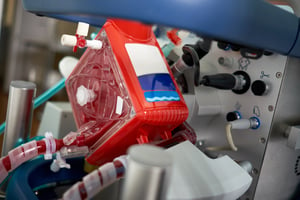Critical COVID-19 Cases Challenge ECMO Centers with Increased Clotting
Doctors in China, the Netherlands and the United States have collectively published reports signifying an increase in blood clots in COVID-19 patients. This phenomenon is seen more commonly in the most serious COVID-19 cases, including patients requiring extracorporeal membrane oxygenation (ECMO) support for acute respiratory distress syndrome.
The authors of a new publication in the Journal of Thrombosis and Hematology identify COVID-19 coagulopathy as a hallmark sign of the disease’s severity. They found that 71.4% of  patients who died of the disease met criteria for disseminated intravascular coagulation (DIC), a condition that affects the body’s clotting factors. Additionally, the study identifies these patients as having predominately pro-thrombotic DIC with high venous thromboembolism rates. Doctors are utilizing heparin and tissue plasminogen activator (tPA) for anticoagulation in hopes of eliminating or reducing the number of clots. However, more official testing needs to be performed to better understand these treatment options.
patients who died of the disease met criteria for disseminated intravascular coagulation (DIC), a condition that affects the body’s clotting factors. Additionally, the study identifies these patients as having predominately pro-thrombotic DIC with high venous thromboembolism rates. Doctors are utilizing heparin and tissue plasminogen activator (tPA) for anticoagulation in hopes of eliminating or reducing the number of clots. However, more official testing needs to be performed to better understand these treatment options.
Extracorporeal Membrane Oxygenation (ECMO) is one therapy utilized to treat the sickest of patients. It is standard for ECMO patients to be systemically anticoagulated to eliminate clots within the ECMO circuit. However, COVID-19 patients are proving difficult to manage. For example, to date, eight COVID-19 patients have been supported with ECMO at Maastricht University Medical Center in Maastricht, Netherlands. All eight have been difficult to fully anticoagulate and limit the clot burden within the ECMO circuit. The clinical perfusionists at Maastricht University Medical Center, explained that their team routinely uses the Transonic’s ELSA Monitor to assess clotting within the oxygenator, the lungs of the ECMO system.
Transonic’s ELSA Monitor quantifies clot burden within the oxygenator with a small volume saline injection. Early detection and trending of clot formation provides a wider window of opportunity to perform oxygenator change-outs. In this group of patients, whose clotting factors are harshly abnormal, the ELSA adds valuable trending measures to warn clinicians of a possible oxygenator change-out. The team at Maastricht University Medical Center are preparing for an ECMO circuit change-out for the 5th time on a current patient, which is considerably higher than non-COVID ECMO patients.
The mechanism of how the virus causes blood clots remains uncertain. Physicians around the world continue to collect information and share experiences to improve outcomes and patient care throughout this pandemic.




